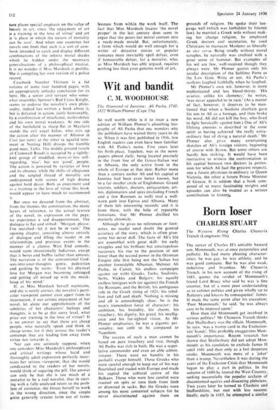Tu quoque
HENRY TUBE
A Fairly Honourable Defeat Iris Murdoch (Chatto and Windus 35s) In her first published book, a study of Sartre, iris Murdoch wrote: The novel, the novel proper that is, is about people's treatment of each other, and so it is about human values ... But it will clearly not be enough for us to know that the novelist has a mature and interesting viewpoint on human affairs and to know from reading his novel what the viewpoint is: our judg- ment of him as a novelist will also depend on how he incarnates his viewpoint in the literary medium, although to put it thus is misleading if it suggests that the particular viewpoint exists apart from its incarnation.' Even if one disagrees with Miss Murdoch's definition of 'the novel proper', a definition she bases on certain nineteenth-century masters, one can presumably accept this as a fair statement of the standards by which she herself wishes to be judged as a novelist. Certainly, as her thirteenth novel comes punctually to hand, standards need to be invoked.
Miss Murdoch has made her own view- point admirably clear on several occasions outside the pages of her novels, notably in her 1967 Leslie Stephen lecture, 'The Sovereignty of Good Over other Concepts,' whose basic philosophy, a kind of secular Christianity derived from Plato and Simone Weil, the title sufficiently suggests. The lec-
lure places special emphasis on the value of beauty in art, since 'the enjoyment of art is a training in the love of virtue' and art
is 'a place in which the nature of morality can be seen'. And when one examines her novels one finds that each is a sort of case- book intended to catch and display different combinations of the infinite moral shades which lie hidden under the necessary generalisations of a philosophical treatise. It is no wonder if Miss Murdoch is prolific. She is compiling her own version of a police record.
Casebook Number Thirteen is a fat volume of some four hundred pages, with an appropriately unlucky conclusion for its hero. He, a senior civil servant who some- what resembles Spenser's Red Cross Knight, seems to endorse the novelist's own philo- sophy, indeed has written a book about it, but is defeated in action, fairly honourably, by a combination of mischance, malevolence and his own moral weakness. At one side of the battlefield (a sharp flat in Mayfair) stands the evil angel Julius, who stirs up the action after the manner of Alfonso in Cosi fan tulle; at the other (a squalid tene- ment in Notting Hill) droops the humble good man, Tallis. The middle ground (south of Cromwell Road) is occupied by a tightly- knit group of muddled, more-or-less self- regarding, 'nice', but not 'good', people. The action is powered by varieties of love and its absence, while the shifts of allegiance and the tangled thread of morality are underpinned with scenes of high drama against bold decor. Both as enjoyment and as a training in the love of virtue this book would appear to have much to recommend it.
But once we descend from the abstract, from the themes, the construction, the many layers of reference, to the actual texture of the novel, its expression on the page, we experience a sad disappointment. The dialogue is flat and stilted: 'Morgan. please. I've searched—let it not be in vain.' The opening chapter, consisting almost entirely of dialogue and filling the reader in on relationships and previous events in the manner of a clumsy West End comedy, would seem intentionally ludicrous, except that it bores and baffles rather than amuses. The narration is of the conventional God- sees-into-your-thoughts genre, pedestrian and gushing by turns: 'Even his physical love for Morgan was becoming unhinged and getting all mixed up with the muck- heap of his mind.'
If, as Miss Murdoch herself maintains, and she is surely correct, the novelist's parti- cular viewpoint cannot exist apart from its incarnation, if our artistic enjoyment of her novel, let alone our apprehension of the subtleties of her characters' feelings and thoughts, is to be at this sorry level, what price our training in the love of virtue? It is no answer to say that these are cheap people, who naturally speak and think in cheap terms, for if they arouse the reader's contempt they are leading him away from virtue not towards it.
Nor can one seriously suppose, when one considers Miss Murdoch's philosophical and critical writings whose lucid and thoroughly adult expression perfectly incar- nates her serious viewpoint, that she would condescend to the readers of her novels, would think of sugaring the pill. The answer can only be that she is too much of a moralist to be a real novelist, that in start- ing with a fully-analysed retort to the prob- lem of existence, she forces herself to work in the wrong direction, since the simple artist generally creates form out of form-
lessness from within the work itself. The fact that Miss Murdoch locates 'the novel proper' in the last century does seem to argue that she pours her moral content into a ready-made mould. But, unfortunately, a form which would do well enough for a writer of detective stories or popular romance must inevitably spell defeat, even if honourable defeat, for a moralist, who, as Miss Murdoch has ably argued, requires nothing less than your genuine work of art.







































 Previous page
Previous page